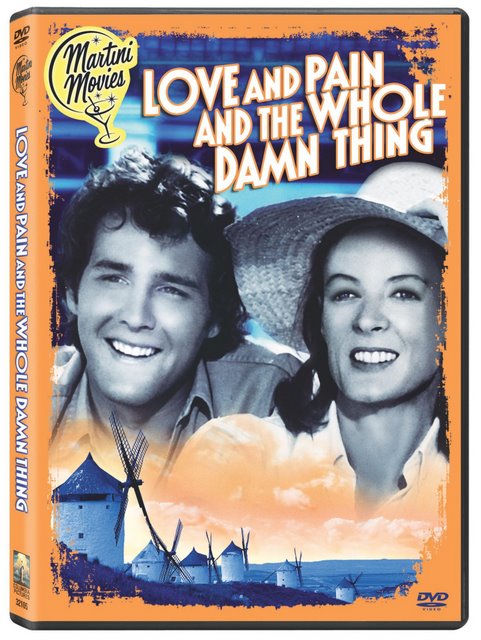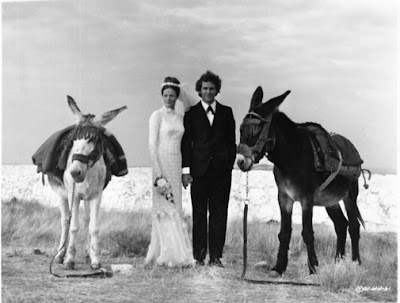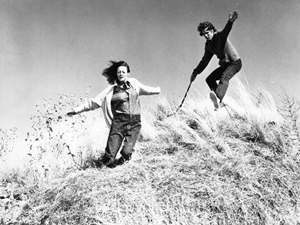Part of Sony's Martini Movies* Collection
Photo Slideshow


Bookmark this on Delicious

Print Page


Easily overshadowed by director Alan J. Pakula's masterworks Klute, All The President's Men, and Sophie's Choice, the filmmaker's unexpectedly moving 1973 hidden treasure sums up its tone in its title of Love and Pain and the Whole Damn Thing.
While no doubt it was a marquee nightmare to abbreviate and I'm sure very few ticket buyers would've forked over cash to something dubbed Love and Pain, thankfully Sony has unearthed this long forgotten oddball romantic comedy drama as part of their peculiarly titled Martini Movies series (explained in the footnote below). With the studio's recent release, Pakula's movie has been given a gorgeous transfer to DVD that revels in its colorful Spanish setting that is sadly not evidenced in these black and white publicity stills.
As the film begins, we encounter the painfully introverted asthmatic Walter Elbertson (Timothy Bottoms) whose wealthy historian author father signs him up for a bicycling tour of Spain upon learning that Walter had fallen asleep during his college exams. Seemingly the only member of his family that doesn't have the same workaholic, overachieving drive shared by the rest, Walter struggles with his asthma in Spain and swaps two wheels for four, ditching the bike for a bus.
In doing so, he finds an unlikely soul-mate in the shy spinster Lila Fisher (Maggie Smith) who, aside from missing the same vital people skills absent in Walter, is thankfully given the benefit of maturity and tact. Needless to say, they easily compliment one another and the two begin an awkward courtship that strengthens when she's locked in a restroom and they realize they are better off sticking together.
Both escaping the claustrophobia of an overbearing family as instead of a Pulitzer Prize winning father, Lila is worn out from taking care of her elderly aunts and forgetful lodgers-- although it's Walter who is the more ardent pursuer since she resists due to their age difference and a secret-- we soon realize they're an ideal match of misfits.
Considering the gender reversal May/December romance between the two and the era of its release, the comparison that immediately springs to mind is with Harold and Maude along with a slight Last Picture Show overlap, especially because they share the same star in the talented Timothy Bottoms. And although Love and Pain isn't as masterful as Hal Ashby's cult classic Maude, it's a terrific find not only for those who enjoy Pakula, Bottoms, and Smith but especially considering the way that it foreshadows the style and evolution of Alvin Sargent's work as a screenwriter.
A diverse and fiercely talented scribe with enviable adaptability considering his contributions to the most recent Spiderman films, Alvin Sargent who had previously collaborated with Pakula in 1969's Sterile Cuckoo found the precise blend of sweet and sour with his original screenplay for Love and Pain and the Whole Damn Thing.
With a strong interest in outsiders and the importance of human connection often between two of the unlikeliest candidates, he's been celebrating the flaws in humanity and the need to find common ground for more than four decades following his transition from television to film. This is especially evident whether he's moving us from laughter to tears in the tale of the estranged father and daughter in Bogdanovich's charmer Paper Moon, cutting deep into the heart of a damaged family unit in Redford's masterful Ordinary People (garnering his second Oscar after Julia), or revisiting the idea of Damn Thing in Mandoki's little-appreciated White Palace. Moreover, looking at one of his earliest cinematic pieces and evaluating the way some of these themes keep inspiring him is a rare treat for screenwriters.
However, as Vincent Canby noted in his original New York Times review, Love and Pain does ultimately (yet possibly only subconsciously) succumb to "the attack of Anglo-Saxon ethic" wherein "American and English fiction writers persist in spreading the gloomy word that the conjoining of an older woman and a young man is a near-mortal sin, usually punishable by death."
However, despite the fact that there's a tearjerker undercurrent that persists throughout which was in vogue during the era, fortunately Sargent avoids making it gloomy on the whole nor ending it with sappy Love Story devastation. Yet refreshingly it avoids the death it predicts shortly into the picture by instead celebrating the fact that-- since life is fleeting and no one has a crystal ball-- we must relish in every Damn Thing we can. And of course, this belief is made even lovelier when we have someone with whom to share our experiences whether we're stuck in a Spanish restroom or trading an over-the-top Don Juan for an asthmatic in a trailer.
*Note: Just what is a Martini Movie? Sony's statement: "No matter the decade, there's a place where icons, idols and the infamous flock for bottomless martinis and over-the-top trysts. One part top-shelf martini, two parts celluloid history and garnished with a hint of camp. Sit back and take in the scene with Sony Pictures Home Entertainment's Martini Movies." All titles released so far in the collection have never been available previously in the DVD format.
Text ©2009, Film Intuition, LLC; All Rights Reserved. http://www.filmintuition.com
Unauthorized Reproduction or Publication Elsewhere is Strictly Prohibited.
Bookmark this on Delicious
Print Page
Easily overshadowed by director Alan J. Pakula's masterworks Klute, All The President's Men, and Sophie's Choice, the filmmaker's unexpectedly moving 1973 hidden treasure sums up its tone in its title of Love and Pain and the Whole Damn Thing.
While no doubt it was a marquee nightmare to abbreviate and I'm sure very few ticket buyers would've forked over cash to something dubbed Love and Pain, thankfully Sony has unearthed this long forgotten oddball romantic comedy drama as part of their peculiarly titled Martini Movies series (explained in the footnote below). With the studio's recent release, Pakula's movie has been given a gorgeous transfer to DVD that revels in its colorful Spanish setting that is sadly not evidenced in these black and white publicity stills.
As the film begins, we encounter the painfully introverted asthmatic Walter Elbertson (Timothy Bottoms) whose wealthy historian author father signs him up for a bicycling tour of Spain upon learning that Walter had fallen asleep during his college exams. Seemingly the only member of his family that doesn't have the same workaholic, overachieving drive shared by the rest, Walter struggles with his asthma in Spain and swaps two wheels for four, ditching the bike for a bus.
In doing so, he finds an unlikely soul-mate in the shy spinster Lila Fisher (Maggie Smith) who, aside from missing the same vital people skills absent in Walter, is thankfully given the benefit of maturity and tact. Needless to say, they easily compliment one another and the two begin an awkward courtship that strengthens when she's locked in a restroom and they realize they are better off sticking together.
Both escaping the claustrophobia of an overbearing family as instead of a Pulitzer Prize winning father, Lila is worn out from taking care of her elderly aunts and forgetful lodgers-- although it's Walter who is the more ardent pursuer since she resists due to their age difference and a secret-- we soon realize they're an ideal match of misfits.
Considering the gender reversal May/December romance between the two and the era of its release, the comparison that immediately springs to mind is with Harold and Maude along with a slight Last Picture Show overlap, especially because they share the same star in the talented Timothy Bottoms. And although Love and Pain isn't as masterful as Hal Ashby's cult classic Maude, it's a terrific find not only for those who enjoy Pakula, Bottoms, and Smith but especially considering the way that it foreshadows the style and evolution of Alvin Sargent's work as a screenwriter.
A diverse and fiercely talented scribe with enviable adaptability considering his contributions to the most recent Spiderman films, Alvin Sargent who had previously collaborated with Pakula in 1969's Sterile Cuckoo found the precise blend of sweet and sour with his original screenplay for Love and Pain and the Whole Damn Thing.
With a strong interest in outsiders and the importance of human connection often between two of the unlikeliest candidates, he's been celebrating the flaws in humanity and the need to find common ground for more than four decades following his transition from television to film. This is especially evident whether he's moving us from laughter to tears in the tale of the estranged father and daughter in Bogdanovich's charmer Paper Moon, cutting deep into the heart of a damaged family unit in Redford's masterful Ordinary People (garnering his second Oscar after Julia), or revisiting the idea of Damn Thing in Mandoki's little-appreciated White Palace. Moreover, looking at one of his earliest cinematic pieces and evaluating the way some of these themes keep inspiring him is a rare treat for screenwriters.
However, as Vincent Canby noted in his original New York Times review, Love and Pain does ultimately (yet possibly only subconsciously) succumb to "the attack of Anglo-Saxon ethic" wherein "American and English fiction writers persist in spreading the gloomy word that the conjoining of an older woman and a young man is a near-mortal sin, usually punishable by death."
However, despite the fact that there's a tearjerker undercurrent that persists throughout which was in vogue during the era, fortunately Sargent avoids making it gloomy on the whole nor ending it with sappy Love Story devastation. Yet refreshingly it avoids the death it predicts shortly into the picture by instead celebrating the fact that-- since life is fleeting and no one has a crystal ball-- we must relish in every Damn Thing we can. And of course, this belief is made even lovelier when we have someone with whom to share our experiences whether we're stuck in a Spanish restroom or trading an over-the-top Don Juan for an asthmatic in a trailer.
*Note: Just what is a Martini Movie? Sony's statement: "No matter the decade, there's a place where icons, idols and the infamous flock for bottomless martinis and over-the-top trysts. One part top-shelf martini, two parts celluloid history and garnished with a hint of camp. Sit back and take in the scene with Sony Pictures Home Entertainment's Martini Movies." All titles released so far in the collection have never been available previously in the DVD format.
Text ©2009, Film Intuition, LLC; All Rights Reserved. http://www.filmintuition.com
Unauthorized Reproduction or Publication Elsewhere is Strictly Prohibited.























